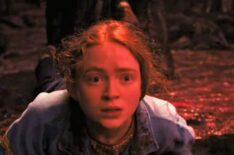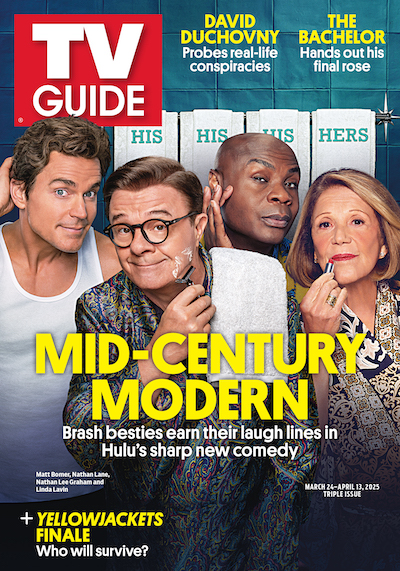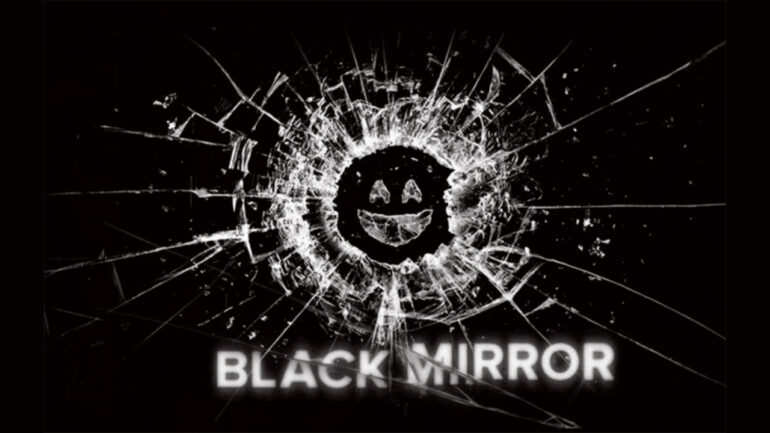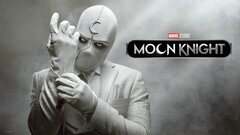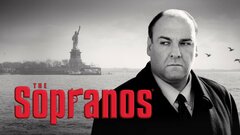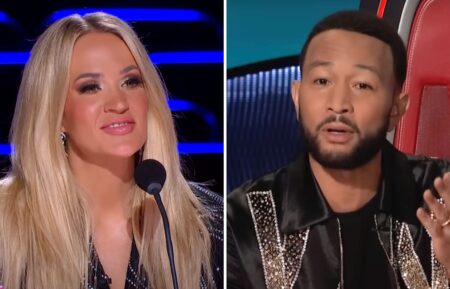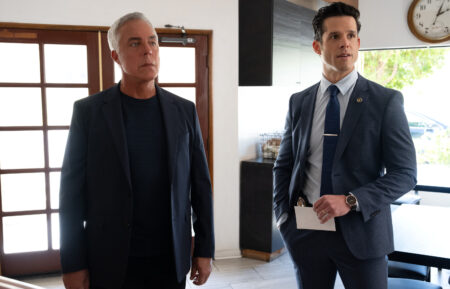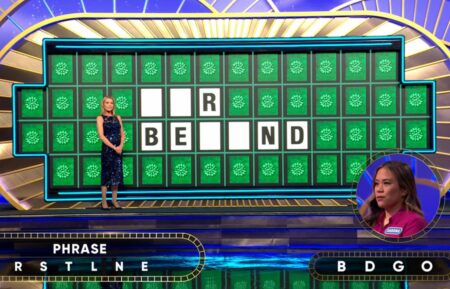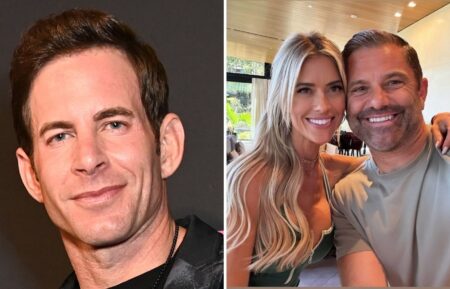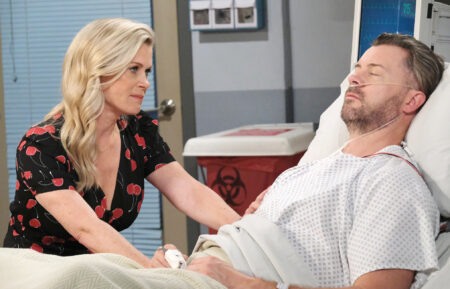7 Iconic Musical Moments on TV, Just Like Linda Ronstadt on ‘The Last of Us’
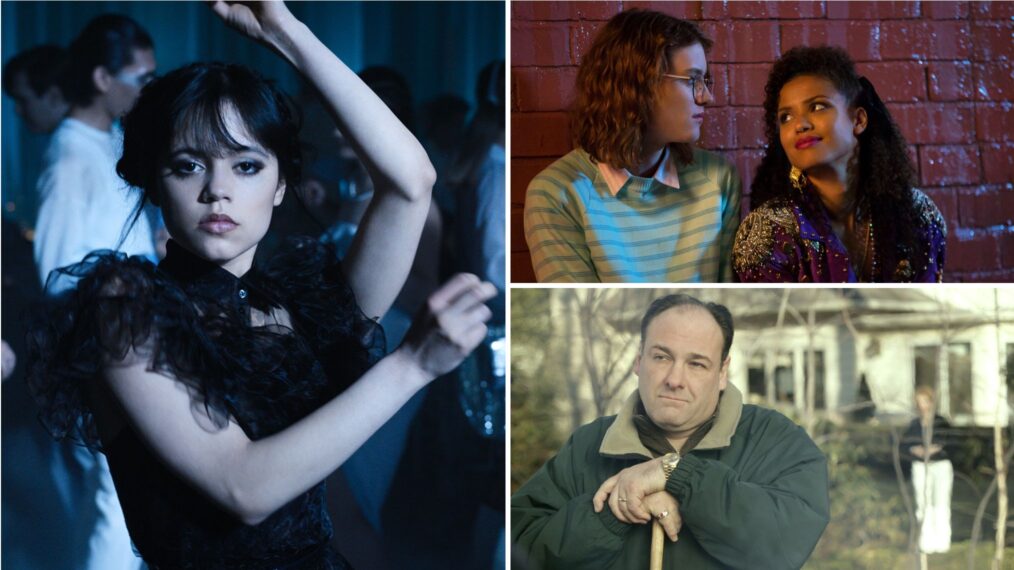
Songs can have the power to make or break a show just from their inclusion in a scene, but shows also have the power to reinvigorate songs because of their inclusion.
Kate Bush’s “Running Up That Hill (A Deal With God)” topped the charts because of its incorporation into the powerful fourth episode “Dear Billy” in Stranger Things. More recently, Linda Ronstadt’s “Long Long Time” was given new life after being used to tell the love story between Bill and Frank in the emotional third episode of The Last of Us. Scenes are sometimes only as compelling as the songs that accompany them.
Get ready to create a new playlist because here are seven more of the best uses of songs in television shows that have elevated the narrative and contributed to their popularity in the charts and on social media.
“I Think We’re Alone Now” by Tiffany (1987)
The Umbrella Academy — “We Only See Each Other At Weddings and Funerals”
The Umbrella Academy is well versed in how to incorporate a song perfectly into a scene, but this one takes the cake. This dance pop hit from Tiffany is a cover of Tommy James and the Shondelles’ 1967 song of the same name. It’s bright, synthy, and oh so full of ’80s nostalgia, so it seems counterintuitive to place this upbeat earworm during the tense reunion of superpowered siblings Luther (Tom Hopper), Diego (Daniel Castañeda), Allison (Emmy Raver-Lampman), Klaus (Robert Sheehan) and Viktor (Elliot Page) at the funeral of their cold-hearted adoptive father Sir Reginald Hargreeves (Colm Feore).
“I Think We’re Alone Now” makes its appearance during a lull in the angst of the episode when Luther, while exploring his childhood bedroom, finds Tiffany’s record amongst the dusty collection and pops it onto the record player. The rest of the siblings, each in a separate section of the mansion, hear the ’80s staple and start to dance in endearingly awkward ways, shedding their hardened adult selves and letting their inner children shine because, well, they’re alone now! The song choice is a little on the nose, but it is a charming display of how pop hits from childhood can unite even the most dysfunctional of families. The scene quickly proved to be a fan favorite of the series and the song even received the TikTok treatment.
“Goo Goo Muck” by The Cramps (1981)
Wednesday — “Woe What A Night”
The Cramps’ cover of the 1962 original Ronnie Cook and the Gaylads song tells the story of a teenager who turns into a monster at night when the moon is out, which any viewer of Wednesday would know is perfect for the supernatural teen comedy. Solitary and macabre Wednesday (Jenna Ortega) attends the Rave ’N Dance with Tyler (Hunter Doohan) and breaks out of her shell with a retro-infused dance to “Goo Goo Muck,” choreographed by Ortega herself. Tyler’s amusement at Wednesday’s dance is shared by the audience, who expects nothing less than a delightfully odd dance from the gothic character. Like Ortega’s performance as the iconic Wednesday, this scene is jaunty and fun with a spooky song to boot.
The dance quickly became a viral sensation and the most memorable part of the series, spawning a TikTok trend. While “Goo Goo Muck” increased in popularity from the series, another song (Lady Gaga’s “Bloody Mary”) also became reinvigorated as a result of the TikTok recreation of Wednesday’s dance, breaking into the Billboard Hot 100 chart a decade after its release.
“The Night We Met” by Lord Huron (2015)
13 Reasons Why — “Tape 3, Side A”
“The Night We Met” appeared on Lord Huron’s 2015 studio album Strange Trails, a whole two years before 13 Reasons Why made the song the heart of the teen drama series. The track is first heard during a flashback in the first season, when Clay (Dylan Minnette) asks his friend Tony (Christian Navarro) the name of the song he danced to with Hannah (Katherine Langford) at their school’s winter formal. Though this moment isn’t the exact night they met, it was one of their happier moments together.
The track’s themes of the slow breakdown relationship (“I had all and then most of you/Some and now none of you”) and the heartbreak that lingers from it resonate with Clay’s grief for Hannah (“I don’t know what I’m supposed to do/Haunted by the ghost of you”). “The Night We Met” achieved massive commercial success after its inclusion in 13 Reasons Why, entering the charts in several countries and even becoming certified platinum by the RIAA. The song currently has over a billion streams on Spotify.
“Don’t Stop Believin’” by Journey (1981)
The Sopranos — “Made in America”
Journey’s 1981 hit “Don’t Stop Believin’” has had its fair share of appearances in television, but its use in the final episode of The Sopranos is one of the most iconic because of its association with the controversial ending of the series. As the law and the mob close in on Tony Soprano (James Gandolfini) and his family, he decides to have a quiet dinner with his wife and children at a diner. “Don’t Stop Believin’” juxtaposes the sober circumstances of the episode, imbues the scene with a hopeful undertone by overlaying Carmela (Edie Falco) and Anthony (Robert Iler) discussing the most mundane aspects of their days as their world crashes down around them.
“Don’t Stop Believin’” is an uplifting and beloved song, so it being used in a serious show and at a somber moment in The Sopranos’ final episode is an expert demonstration of irony. As if “Don’t Stop Believin’” could get any more popular, the track saw a huge growth in digital downloads after the final episode’s release.
“Dead of Night” by Orville Peck (2019)
Euphoria — “Trying to Get to Heaven Before They Close the Door”
HBO’s Euphoria is known for its impressive and popular soundtrack, which made choosing just one example for their best use of a song a difficult task. “Dead of Night” by Orville Peck is an excellent example of how to establish ambiance as well as communicate story and character. Released by country alternative singer Orville Peck as the second single off his album Pony, “Dead of Night” tells the tale of troubled relationship that ends in tragedy.
The track is fitting as the introduction to Cassie (Sydney Sweeney) and Nate’s (Jacob Elordi) relationship, which is a main point of contention in the second season of Euphoria. “Dead of Night” has a haunting ambiance that foreshadows the dark trajectory of Cassie and Nate’s relationship. The song plays in the first episode of the series as Nate speeds down a highway drinking with Cassie in the passenger seat late at night. Initially nervous, Cassie quickly lets her guard and hair down and relishes in the sense of adventure as Nate gazes at her. “Dead of Night” is a song told in hindsight that evokes nostalgia and regret. It underscores the fate of Cassie and Nate’s relationship, as well as the destruction it has on those around them. The track’s streams increased ninefold after its inclusion in the series.
“Heaven Is a Place on Earth” by Belinda Carlisle (1987)
Black Mirror — “San Junipero”
Netflix’s science fiction anthology series Black Mirror has notably bleak episodes, but “San Junipero” opted for the alternative. Set in the beachside town of San Junipero, the episode follows the love story between Yorkie (Mackenzie Davis) and Kelly (Gugu Mbatha-Raw). San Junipero is a simulated reality used in a type of rehabilitation called nostalgia therapy, where the elderly can temporarily upload their consciousness and live in the bodies of their younger selves and the deceased can ‘live’ forever, if they choose.
“Heaven Is a Place on Earth” perfectly encapsulates Yorkie and Kelly’s relationship. Though San Junipero can alter to fit any decade, Yorkie and Kelly decide to live in its ’80s iteration because it was a time both were unable to be open about their sexual identities during their youth. In San Junipero, Yorkie and Kelly can have a heaven on earth where they are free to love each other. Their heaven is solidified when they both make the decision to permanently live in San Junipero after they both die, their consciousnesses placed next to each other. “Heaven Is a Place on Earth” plays twice in the episode, but its use in the credits provides the perfect outro as Yorkie and Kelly kiss and drive off into the sunset. The ’80s tune has been praised by fans and critics alike for its inclusion in the episode.
“A Man Without Love” by Engelbert Humperdinck (1968)
Moon Knight — “The Goldfish Problem”
Though Marvel is known for their heroic, soaring scores, they sure know how to include a pre-existing tune. Engelbert Humperdinck’s version of “A Man Without Love” appears in the first episode of the Marvel Disney+ series Moon Knight as Steven Grant (Oscar Isaac) wakes up in concerning circumstances and then goes about his morning routine. Steven is later revealed to be an alter of Marc Spector, a mercenary with dissociative identity disorder who is able to transform into Moon Knight with the help of Egyptian god Khonshu.
“A Man Without Love” is a ballad about a man heartbroken over a relationship that ended, but it also speaks to being unable to recognize oneself after a traumatic event (“Every day I wake up/Then I start to break up”). At this point in the series, Steven Grant is unaware of his diagnosis let alone that he is an alter of Marc, but he is aware there is an issue: He experiences frequent blackouts and wakes up in unusual states that leave him afraid and confused. The track represents the progression of Steven’s mental state, appearing during the establishing scene of the series and in the final episode when Steven and Marc have reconciled their existences. Humperdinck’s “A Man Without Love” trended on TikTok and charted in the top ten of various countries’ Shazam charts.
What are some of your favorite uses of songs in television?
From TV Guide Magazine
How Hulu's 'Mid-Century Modern' Is a 'Golden Girls' for Our Times
Settle in for some older and bolder laughs with the BFFs of a certain age in the new comedy starring Nathan Lane, Matt Bomer, and Nathan Lee Graham. Read the story now on TV Insider.

